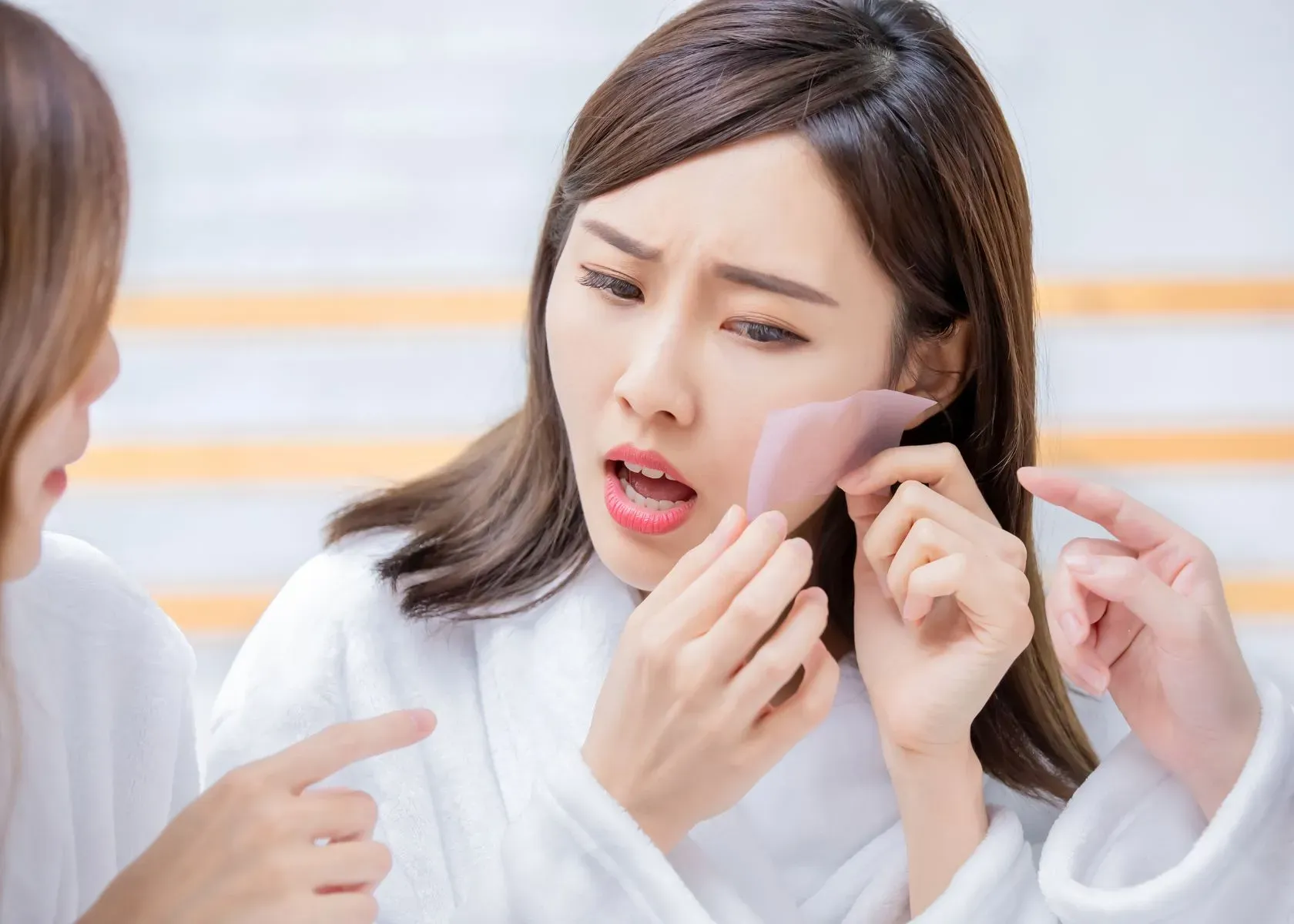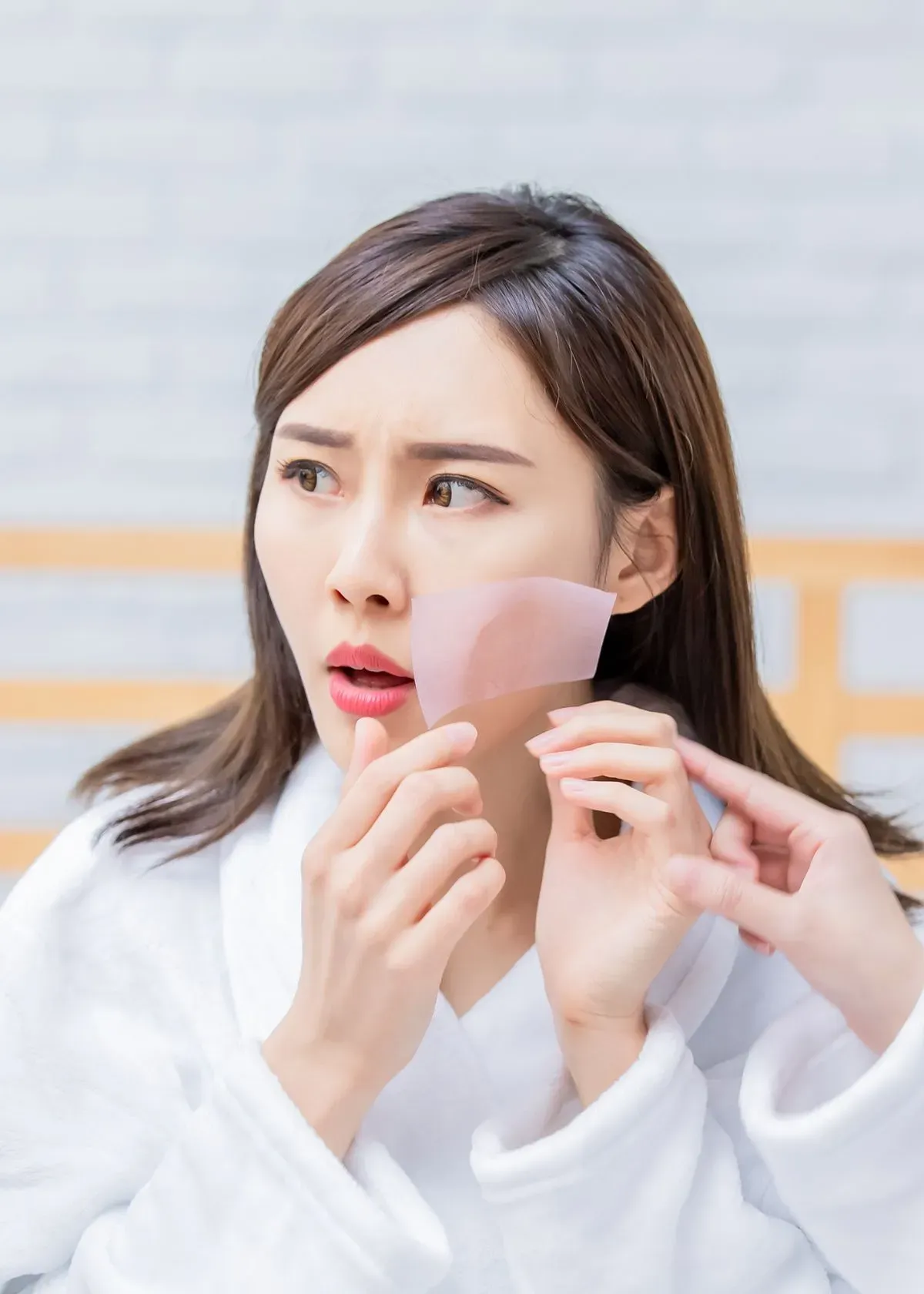Are you tired of that icky feeling on your skin that won't go away? You know, when it feels like your face is coated in a layer of glue. Many folks struggle with sticky skin, especially during warm weather or after exercising.
It's not just uncomfortable; it can make us self-conscious, too. But don’t worry, there’s hope! Did you know drinking water all day can help fight off stickiness?
Our blog has got the scoop to help you wave goodbye to clammy skin for good! We'll teach you about different skin types and how to pick the right products, share tips for preventing oil build-up, and give cool ideas for staying fresh in summer heat.
Plus, we’ve packed our post with pointers on keeping your skin clear and smooth without feeling glued down. Get ready to feel free again! Keep reading – flawless, non-sticky skin awaits!
- Know your skin type and choose the right products to reduce oiliness and prevent sticky skin. Oily skin types may benefit from salicylic acid-based cleansers, while dry skin should use hydrating products like hyaluronic acid serum.
- Practice good hygiene, such as washing your face twice a day with a gentle cleanser, changing pillowcases often, and using antifungal powder in sweaty areas to manage stickiness.
- Use blotting papers for quick removal of excess oil during the day to maintain a fresh look without disrupting makeup or clogging pores.
- Apply lightweight, non-comedogenic sunscreen daily to protect your skin from UV rays without adding greasiness. Wear breathable fabrics like cotton to help keep the skin cool and less sticky.
- Regular exfoliation helps clear away dead cells and excess oil that can lead to sticky residue on the skin; gentle exfoliating scrubs or chemical exfoliants are both effective options.
Preventing and Managing Sticky Skin

Maintaining proper hygiene habits, using antifungal powder, and using blotting paper for excess oil can help prevent and manage sticky skin.
These simple tips can make a significant difference in keeping your skin feeling fresh and non-sticky throughout the day.
Proper Hygiene Habits
To prevent sticky skin, it's essential to maintain proper hygiene habits. Wash your face with a gentle cleanser twice a day to remove sweat and impurities. Use alcohol-free products to avoid making the skin more oily. Change your pillowcase regularly to prevent oil and sweat buildup.
Keep hats, headbands, and clothes clean before wearing them to reduce stickiness. Limit the use of certain medications that can contribute to oily and sticky skin.
Using Antifungal Powder
Antifungal powder can effectively manage sticky skin by reducing moisture and preventing fungal infections. This product works by absorbing excess sweat and oil, keeping the skin dry and free from stickiness.
By applying antifungal powder to areas prone to stickiness, such as underarms, feet, or groin area, you can prevent discomfort and irritation caused by sticky skin, promoting a fresher and more comfortable feeling throughout the day.
Antifungal powders contain ingredients like miconazole or clotrimazole, which fight against fungus growth on the skin's surface. Regular use of antifungal powder can help maintain a healthy balance of microorganisms on the skin while reducing stickiness caused by excessive sweat production.
Blotting Paper for Excess Oil
Oily skin type is more prone to stickiness. Moreover, oil is what makes your skin sticky, especially when you have dead skin cells. To prevent sticky or greasy skin, you need to get rid of oils resulting from excessive sweating on your facial skin.
Blotting paper quickly absorbs excess oil from the sensitive skin, helping to reduce stickiness and shine. By gently pressing a sheet of blotting paper onto oily areas of the face, such as the forehead, nose, or chin, it can effectively lift away the unwanted oil without disturbing makeup.
This convenient solution is especially beneficial for those with oily or combination skin types who struggle with mid-day shininess. Using blotting papers throughout the day helps maintain a more balanced and matte complexion.
Additionally, using blotting paper can help prevent clogged pores caused by excess oil production. Removing the surface oil that contributes to sticky skin reduces the risk of breakouts and keeps your skin fresh and clean.
Lightweight Skincare Products
Lightweight skincare products are essential for preventing sticky skin, especially during the summer months. Look for oil-free moisturizers and non-comedogenic sunscreens to avoid clogging pores.
Hyaluronic acid serums can also help keep the skin hydrated by retaining natural moisture without feeling heavy or sticky, making them a great addition to your skincare routine.
Additionally, choosing gel-based cleansers and water-based lightweight foundations can help maintain a non-sticky feel throughout the day.
Essential Summer Skincare Tips

Protect your skin from the sun, stay hydrated, use lightweight products, and avoid excessive humidity for a comfortable summer skincare routine. Read on to discover more essential tips for maintaining non-sticky skin.
Sun Protection
Protect your skin from harmful UV rays by applying a broad-spectrum sunscreen with an SPF of at least 30, even on cloudy days. Wearing protective clothing, such as wide-brimmed hats and sunglasses, can further shield your skin from sun damage.
Seek shade during peak sunlight hours, typically between 10 a.m. and 4 p.m., when the sun’s rays are the strongest.
Reapply sunscreen every two hours or more frequently if swimming or sweating profusely to maintain its effectiveness. Utilize physical barriers like umbrellas and protective clothing for additional defense against direct sun exposure.
Hydrating Regularly
After ensuring sun protection, don't forget the importance of hydrating regularly to maintain healthy and non-sticky skin. Drinking plenty of water throughout the day can help combat sticky skin by keeping it well-hydrated and reducing oiliness.
Consider using a hyaluronic acid serum as it has excellent moisturizing properties that can effectively reduce stickiness and oiliness in the skin without clogging pores.
Also, incorporating lightweight moisturizers into your skincare routine can keep your skin hydrated without feeling heavy or greasy. Using a gentle cleanser is crucial for removing sweat, oil, and impurities contributing to stickiness.
Using Lightweight Products
Lightweight skincare products are crucial for preventing sticky skin, especially during the summer months. Look for oil-free moisturizers, serums, and sunscreens labeled as non-comedogenic to avoid clogging pores and excess oiliness.
These products can help maintain skin hydration without adding to the stickiness. Moreover, choosing lightweight sunscreen with a gel or water-based formula will ensure effective sun protection without leaving a heavy or greasy residue on the skin.
By incorporating lightweight products into your skincare routine, you can effectively combat sticky skin while maintaining essential moisture levels and protecting your skin from environmental factors.
Avoiding Excessive Humidity
To avoid excessive humidity, opt for breathable fabrics like cotton to allow your skin to breathe and prevent stickiness. Choosing lightweight sunscreen can help minimize the greasy feeling caused by high humidity.
Keeping the skin well-hydrated is crucial in combating sticky skin; therefore, using a hyaluronic acid serum can help reduce stickiness and oiliness in humid conditions.
Using blotting papers or medicated pads can also be effective in reducing the oiliness and stickiness caused by excessive humidity. Moreover, it's essential to cleanse the skin regularly using gentle cleansers to remove sweat, oil, and impurities contributing to stickiness in high-humidity environments.
How to Get Rid of Sticky Skin - FAQs
In the frequently asked questions (FAQ) section below, we'll address some of the top questions regarding what causes sticky skin, plus provide tips on how to remove residue for smooth, fresh skin.
We'll cover proper cleansing techniques, exfoliating scrubs you can make at home, and daily moisturizing practices to prevent tackiness from returning.
What causes my skin to feel sticky?
Sticky skin can be caused by sweating natural oils, applying too much lotion or moisturizer, or not cleansing the skin properly.
How can I treat sticky skin at home?
For treating sticky skin, cleanse your skin thoroughly with a gentle cleanser and use only enough moisturizer to keep your skin hydrated without feeling greasy. Also, try using remedies like mild soaps that remove sweat without over-drying.
Are there ways to prevent my skin from becoming sticky?
Yes! Preventing sticky skin involves keeping your body cool to reduce sweat, using non-greasy moisturizers appropriately, and maintaining a regular cleansing routine.
Can removing residue help get rid of stickiness on my skin?
Definitely! Removing any leftover residue from products or substances is key in dealing with Sticky Skin relief—gently wash the area with soap and water for best results.
What should I do if my sweaty and sticky Skin doesn't improve?
If you're still struggling with sweaty, Sticky Skin treatment after trying these tips, it might be time to see a healthcare provider for further advice on Sticky Skin solutions.
Conclusion
Maintaining healthy, non-sticky skin requires understanding your skin type and using appropriate products. Prevent stickiness by practicing good hygiene habits and using anti-fungal powder as needed.
Essential summer skincare tips include sun protection, regular hydration, and lightweight products. To maintain non-sticky skin, exfoliate regularly and choose breathable fabrics along with lightweight sunscreen.
Remember that a good skincare routine can significantly impact the health of your skin. In the comments below, tell us how you usually get rid of sticky skin.
Read More About Skincare Tips





